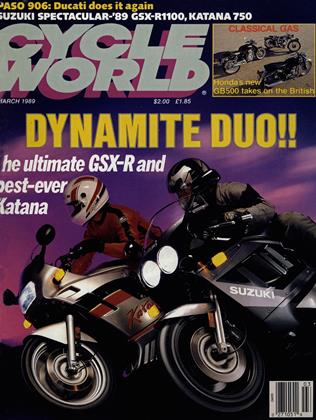The French incident
UP FRONT
David Edwards
THE NEWPORT BEACH POLICEMAN caught me with my pants down; well, with my front wheel up, actually.
Now, I know this kind of conduct is unbecoming for the Editor of a national motorcycle publication, but Em head-over-heels in love with and hopelessly addicted to that most juvenile of motorcycle pranks: the wheelie. I usually indulge myself in such mischief only on the racetrack or in the dirt, but this day the monkey was on my back and talking trash.
It was on a side street through an industrial park, and as I pulled away from the stop sign and shifted into second, I gave the EX500’s handlebars a little tug and the front end leapt into the air like a playful harrier going for a Frisbee.
How was I to know that 50 yards into some quality air time, a police cruiser would wheel onto the street? Even as I chopped the throttle and the front tire smacked back down to terra firma, the police car’s uniformed occupant had his red-andblues lit and spinning.
Now, anyone who rides motorcycles certainly has occasion to run afoul of our nation’s pistol-packing public servants. And most of us have stories, proudly recounted, of how we talked our way out of this or that ticket. I like the one that dead-pan comedian Steven Wright tells: “One time the police stopped me for speeding. They said, ‘Don’t you know the speed limit is 55 miles an hour?’ I said, I know, but I wasn't going to be out that long.”
Somehow, I knew humor wasn’t going to get me out of this. But all wasn’t bleak. The guy was a rider and sometimes - reader of Cycle World, and instead of slapping me with a reckless-driving citation—a misdemeanor—he issued a less-damaging unsafe-start ticket. Not too bad, considering the flagrancy of my violation.
But a few months earlier, in France, I’d done much better. This time I wasn’t the perpetrator of a wheelie; my crime was garden-variety speeding. I was riding a root-beer-colored Harley Low Rider along the Normandy coast, the site where the Allies had invaded Europe to begin the end of World War II. Normandy is at once a beautiful and moving place, with lush fields and ancient villages that fall very easily on the eye. And it is a place with stark reminders of a time when all was not so peaceful. Dotted along the coastline are German artillery fortifications, long ago abandoned and left to decay and rust. At the U.S. Military Cemetery near St. Laurent, row after row after row—10,000 in all—of small, white monuments solemnly overlook the English Channel. History is very close and very heavy in Normandy.
Given the beauty and significance of such a place, I suppose I can be forgiven for missing the 30-kilometer-per-hour speed-limit sign as I rode through a three-building “village” on my way to see the cathedral at Rouen. What I’d unwittingly done, though, was power through the Gallic equivalent of a deep-South speedtrap at 65 mph rather than the prescribed 18. There was no jumbobellied Smokey in a pursuit-motor Dodge to pull me over; instead I was motioned to a standstill by a dapperly dressed gendarme who appeared as if he was on the way to a Charles de Gaulle look-alike contest.
Mrs. Eller, my 11thand 12thgrade French teacher, had imparted a working knowledge of the language, but even if I’d been from the planet Mars, I’d have known that I was in deep trouble here, up the Seine without as paddle, so to speak.
Monsieur de Gaulle was hopping mad and asking for my papers. The clump of documents that I handed over only made matters worse. First,
there was the registration and insurance forms for the bike, which were in German because I had borrowed it from Harley-Davidson of West Germany. Then came my passport, which, because I was born in England, is British. Then, the pièce de résistance, my California driver’s license, which caused the police officer to tilt his hat back on his head and cast his eyes to the heavens.
I was promptly marched over to a blue, municipal-looking van, in which sat my accuser’s twin brother, busily pecking away on a typewriter at what was apparently my citation. Somehow I knew it wasn’t in honor of me being the millionth Britishborn American resident to pass through the region on a German Harley. At this point, I was past arguing, even if I could have strung together enough French words to put up a good defense. Besides, the citation upon which the details of my infraction were being engraved was a goodlooking certificate, all scrolled and filigreed, easily as impressive as my journalism B.A. I’d just pay the fine and have a souvenir of my French wrongdoing to hang on my office wall.
Except that when I did a rough conversion of francs to dollars, I discovered my ticket française was going to cost—I forget the exact figureover $100. I didn't have it, at least not in French currency, and these guys didn’t appear to be equipped to take an American Express card. Hoping for some measure of diplomatic immunity, I finally put my hands together, handcuff-style, and said, “Okay, take me to the Bastille,” referring to the famous French prison.
I thought I’d made a big mistake, as de Gaulle I scowled at me and puffed his chest so much that I got ready to duck to miss the flying tunic buttons. But de Gaulle II saved the day by bursting into a laughing fit. His partner registered defeat and gruffly told me to be on my way, admonishing me with a wagging finger to, “Faites attention" to the speed limit.
Oh, yes sir, count on it. As I was to rediscover a few months later, paying attention beats the absolute, living merde—if you’ll pardon my French—out of paying a fine, anyday.














